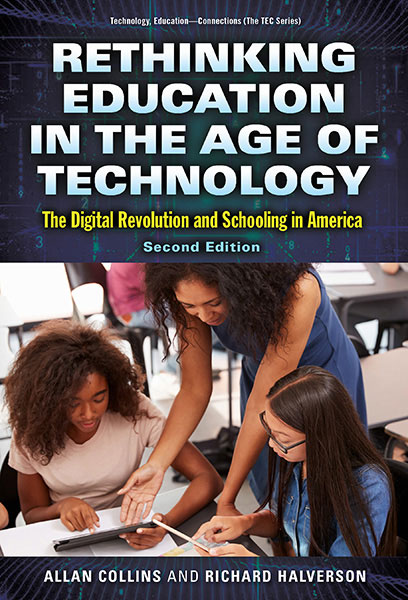Professors: Request an Exam Copy
Print copies available for US orders only. For orders outside the US, see our international distributors.
Second Edition
Allan Collins, Richard Halverson
Foreword by: James Paul Gee
Publication Date: April 13, 2018
Pages: 192
Series: Technology, Education—Connections (The TEC Series)

The digital revolution in education is well under way, with more and more learners plugged into the online world. How can schools make the most of both the technology and the learning potential of today’s “born digital” students? In this new edition of their groundbreaking book, Collins and Halverson argue that new technologies have transformed our workplaces, our lives, and our culture and it is time we take the next step to transform learning—in and out of schools. The authors show how, over time, public schooling was so successful that it became synonymous with education. But new technologies risk making schools obsolete and this book explains why and how today’s educators, policymakers, and communities must adapt to provide all learners with access to the new learning tools of the 21st century.
The insightful, Second Edition:
Allan Collins is professor emeritus of Education and Social Policy at Northwestern University, former co-director of the U.S. Department of Education’s Center for Technology in Education, and author of What's Worth Teaching? Rethinking Curriculum in the Age of Technology. Richard Halverson is professor of Educational Leadership and Policy Analysis at the University of Wisconsin–Madison, where he is co-founder of the Comprehensive Assessment of Leadership for Learning project and co-director of the Wisconsin Collaborative Education Research Network.
“Allan Collins and Richard Halverson, in the second edition of their already highly impactful book, are pointing to the powerful out-of-school teaching and learning journeys that kids can take today. They are not by any means arguing that teachers or schools should go away. Rather, they are saying that they should open their doors and windows, connect to other real and virtual places, be crucial tour guides, and send their children on flights of fancy through our modern memory palaces.”
—From the Foreword by James Paul Gee, Mary Lou Fulton Presidential Professor of Literacy Studies, Regents’ Professor, Arizona State University
“The most convincing account I've read about how education will change in the decades ahead—the authors' analyses are impressive, fair-minded, and useful.”
—Howard Gardner, Harvard Graduate School of Education (from first edition)
Tentative Table of Contents
Foreword by James Paul Gee
Acknowledgments
Preface to the Second Edition
Preface to the First Edition
Chapter 1. How Education Is Changing
The Structure of the Book
Chapter 2. The Technology Enthusiast's Argument
The Changing World
Enhanced Capabilities for Educating Learners
The Enthusiasts' Vision of Schooling
Chapter 3. The Technology Skeptic's Argument
Locked in Place?
Why Education Reforms Fail
Barriers to Technology Use in Schools
Synthesis: Incompatibilities Between Schools and Technology
The Skeptic's Vision of Schooling
Chapter 4. The Development of American Schooling
From Apprenticeship to Universal Schooling
The Establishment of Universal Schooling in America
The Evolution of a School System
How the Demands on Schools Have Changed
Chapter 5. The Seeds of a New System of Education
Seeds That Support School Learning
Interest-Based Learning Environments in the Wild
Conclusion
Chapter 6. The Three Eras of Education
Responsibility: From Parents to the State to Individuals and Parents
Expectations: From Social Reproduction to Success For All to Individual Choice
Content: From Practical Skills to Disciplinary Knowledge to Learning How to Learn
Pedagogy: From Apprenticeship to Didacticism to Interaction
Assessment: From Observation to Testing to Embedded Assessment
Location: From Home to School to Anywhere
Culture: From Adult Culture to Peer Culture to Mixed-Age Culture
Relationships: From Personal Bonds to Authority Figures to Computer-Mediated Interaction
Critical Transformations in Education
Chapter 7. What May Be Lost and What May Be Gained
What May Be Lost
What May Be Gained
Realizing the Promise and Mitigating the Dangers
Chapter 8. How Schools Can Support the New Technologies
Performance-Based Assessment
New Curriculum Designs
New Approaches to Equity in a Digital World
Chapter 9. What Does it All Mean?
What Are Kids Learning from Technology?
How Has Technology Changed Kids' Social Lives and Learning?
Where Does This Leave Us?
Chapter 10. Rethinking Education in a Technological World
Rethinking Learning
Rethinking Motivation
Rethinking What is Important to Learn
Rethinking Careers
Rethinking the Transitions Between Learning and Work
Rethinking Educational Leadership
Rethinking the Role of Government in Education
Our Vision of the Future
References
Index
About the Authors
Professors: Request an Exam Copy
Print copies available for US orders only. For orders outside the US, see our international distributors.